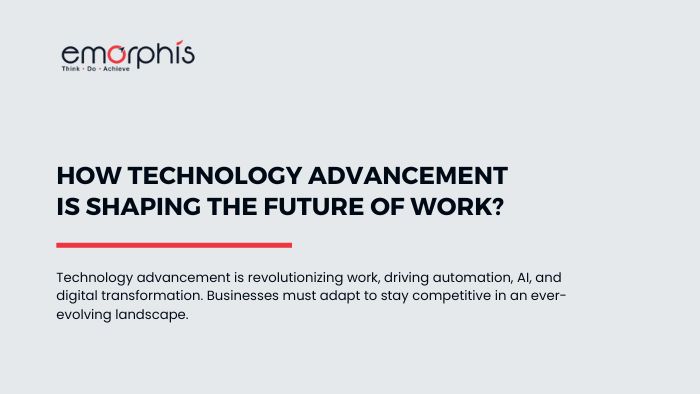Introduction
In today’s rapidly evolving world, technology advancement has become the cornerstone of digital transformation across various industries. Every sector is experiencing a shift in how they operate, engage with customers, and deliver products and services. From healthcare to finance, manufacturing, and education, digital transformation is taking over, driven by technological innovation.
This article delves into how technology advancement is accelerating digital transformation, the future technologies fueling this change, the challenges organizations face in adoption, and how businesses can leverage the full potential of these advancements.
The digital transformation market, valued at $693.6B in 2023, is projected to hit $3,605.04B by 2031 according to a report by Kings Research. As businesses digitize, cybersecurity threats rise, pushing investments in AI security and blockchain. Embracing digital transformation ensures agility, innovation, and long-term growth.

According to the Cognitive Market Research report, emerging and next-generation technologies, including AI, quantum computing, blockchain, 5G, and biotechnology, have experienced rapid growth in 2023 and 2024. The global AI market surged from $142.3B in 2023 to $190.6B in 2024, with 60% of major enterprises integrating AI for enhanced efficiency. The quantum computing sector grew at a 50% CAGR, reaching $1.8B in 2024, driven by breakthroughs from IBM, Google, and Microsoft. Blockchain adoption expanded, with 80% of financial institutions exploring its potential. The 5G infrastructure market reached $13.3B, while the biotechnology sector climbed to $734.8B, fueled by advancements in gene editing and personalized medicine.
The United States remains a global leader, with its emerging tech market reaching $400B in 2024, holding 35% of the global share. The U.S. government has significantly invested in AI ($85B in 2024) and quantum research, accelerating innovations across healthcare, finance, defense, and automotive industries. With 5G adoption reaching 65% of the population, the nation continues to dominate technological advancements and R&D funding.
What is Technology Advancement?
Technology advancement refers to continuous improvements and innovations in technology, ranging from artificial intelligence (AI) and machine learning to the Internet of Things (IoT) and blockchain. These advancements enhance how businesses operate, optimize processes, and interact with customers. Whether it’s cloud computing, automation, or the development of smart devices, technology advancement enables organizations to become more agile, efficient, and responsive to the needs of their consumers.
Digital Transformation: A New Era for Businesses
Digital transformation is the integration of digital technology into all areas of a business, fundamentally changing how it operates and delivers value to customers. At its core, digital transformation is about adopting digital tools and platforms that allow businesses to streamline processes, improve customer experiences, and open up new revenue streams.
Technology advancement acts as the driving force behind digital transformation, offering businesses the tools they need to stay competitive. Whether through automation of manual tasks or the adoption of new technologies that enable greater scalability, technology advancement is transforming the way companies interact with their customers and improve internal operations.

The Future of Technology Driving Digital Transformation
As we move into the future, several emerging technologies are set to accelerate digital transformation even further:
a. Artificial Intelligence (AI) and Machine Learning (ML)
AI and ML are already playing a crucial role in digital transformation. With the help of AI, businesses can analyze vast amounts of data, predict customer behavior, and make informed decisions. Machine learning is enhancing predictive analytics and automation, allowing businesses to operate more efficiently and stay ahead of the curve. AI software development services technologies enable companies to provide more personalized services, improving customer satisfaction and loyalty.
b. The Internet of Things (IoT)
The IoT connects devices, sensors, and software applications, allowing for seamless communication between systems. This interconnectedness is driving digital transformation by enabling businesses to monitor processes in real-time, optimize resource usage, and provide customers with more engaging experiences. From smart homes to connected supply chains, IoT is revolutionizing how industries function.
c. Cloud Computing
Cloud computing solutions have emerged as one of the major enablers of digital transformation. By allowing businesses to store and access data remotely, cloud platforms reduce the need for costly infrastructure while enabling flexibility, scalability, and easy access to innovative tools and applications. Cloud services offer real-time collaboration, which supports the digital shift in business operations.
d. Blockchain
Blockchain is set to revolutionize industries like banking, supply chain, and healthcare by providing secure and transparent ways to track transactions and manage data. With its decentralized nature, blockchain plays a significant role in digital transformation by ensuring data integrity and privacy while enhancing the security of online transactions.
e. 5G Networks
The rollout of 5G networks promises to change how businesses leverage connectivity. With faster speeds, low latency, and higher capacity, 5G is expected to push the boundaries of digital transformation, enabling more immersive experiences through augmented reality (AR) and virtual reality (VR), as well as supporting the increasing number of IoT devices.

Challenges in the Adoption of Digital Transformation
Despite the significant benefits of digital transformation, organizations often face challenges when adopting technology advancement. Here are some of the key obstacles:
1. Resistance to Change
One of the primary challenges in digital transformation is resistance from employees. Many workers are accustomed to traditional methods of working and are hesitant to adopt new tools and processes. To overcome this, companies must foster a culture of innovation and provide employees with the necessary training and resources.
2. High Initial Costs
The initial investment required for adopting new technologies can be significant. Smaller businesses, in particular, may struggle with the cost of implementing technology advancement. However, the long-term benefits—such as cost savings, improved efficiency, and enhanced customer experience—often outweigh the initial financial outlay.
3. Integration with Legacy Systems
Many companies have legacy systems in place that are difficult to integrate with newer digital tools. These legacy systems may be outdated or incompatible with modern technologies, creating barriers to digital transformation. To resolve this, businesses need to carefully plan their integration strategies, ensuring that they can incorporate new technologies without disrupting current operations.
4. Cybersecurity Concerns
As more businesses embrace technology advancement and digital transformation, the risk of cyberattacks grows. Digital tools and platforms can become vulnerable to data breaches if not properly secured. Companies must prioritize cybersecurity to protect sensitive data, build trust with customers, and ensure regulatory compliance.
5. Skill Gaps and Talent Shortage
Another significant challenge in digital transformation is the shortage of skilled professionals capable of managing and implementing new technologies. With the rapid pace of technological advancement, businesses may find it difficult to hire experts in AI, cloud computing, cybersecurity, and other key areas. Companies must invest in employee upskilling and explore partnerships with third-party providers to overcome this challenge.

How Technology Advancement Helps Overcome These Challenges
While the challenges of digital transformation can be significant, technological advancement provides the tools necessary to mitigate them:
- Cloud Solutions for Cost Efficiency: With cloud-based technologies, businesses can access advanced software and tools without the need for hefty upfront investments in physical infrastructure. Cloud platforms also offer scalable solutions, allowing companies to pay only for what they use, making digital transformation more accessible.
- Automation for Operational Efficiency: Automation, powered by AI and robotics, allows businesses to streamline repetitive tasks, reduce errors, and increase productivity. By automating manual processes, companies can focus more on innovation and customer-centric strategies, propelling them toward successful digital transformation.
- Data-Driven Insights for Better Decision Making: Big data and advanced analytics tools allow organizations to gather, process, and analyze vast amounts of data quickly and accurately. This empowers businesses to make data-driven decisions, predict trends, and deliver personalized experiences, all of which are critical aspects of digital transformation.
Find details on software product development services.
The Road Ahead: How Businesses Can Prepare for the Future
To successfully navigate the path of digital transformation, businesses must stay ahead of the curve by continuously embracing technological advancement. Here are a few steps to help companies prepare for the future:
I) Focus on Digital Strategy
Developing a clear digital strategy is crucial for businesses to align their goals with technological initiatives. A comprehensive digital roadmap ensures that companies can effectively integrate new technologies into their operations.
ii) Invest in Talent and Training
To maximize the benefits of technology advancement, businesses should invest in talent acquisition and employee training. This ensures that their teams are equipped to manage emerging technologies and contribute to digital transformation efforts.
iii) Partner with Technology Experts
Collaborating with technology providers and consultants can help organizations identify the right tools for their needs and ensure the smooth implementation of new technologies.
iv) Prioritize Security and Compliance
As digital transformation continues to evolve, companies must prioritize cybersecurity measures to protect sensitive data. They should also stay informed about relevant regulatory changes to ensure compliance.

Conclusion
In conclusion, technology advancement is undeniably driving digital transformation, with emerging technologies such as AI, IoT, blockchain, and cloud computing paving the way for businesses to become more efficient, scalable, and customer-centric. However, the journey toward digital transformation is not without its challenges, including resistance to change, integration issues, and cybersecurity concerns. By embracing technological advancement, companies can overcome these obstacles and position themselves for future success in an increasingly digital world.
For more insights on technology advancement and solutions for businesses, visit Emorphis Technologies.







